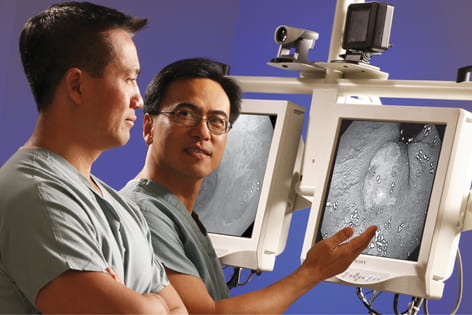When holiday food fights back
Dr. Kenneth Chang, medical director of the H.H. Chao Comprehensive Digestive Disease Center at UC Irvine Medical Center, has pioneered treatment of gastroesophageal reflux disease and other GI disorders.

Roasted meats, stuffing, gravy, pies, cakes, cookies, candies and other abundant special treats can add up to a toxic brew of gastrointestinal distress. Dr. Kenneth Chang, medical director of the H.H. Chao Comprehensive Digestive Disease Center at UC Irvine Medical Center, has pioneered treatment of gastroesophageal reflux disease and other GI disorders. He offers advice on surviving the holidays with minimal digestive distress and explains how heartburn can be a serious matter.
Q: Can certain holiday foods or customs provoke heartburn and acid reflux?
A: If you eat a lot at a single meal, you are increasing your risk for acid reflux. Reflux occurs when stomach contents – especially acid – back up into the esophagus through the lower esophageal sphincter (LES), the muscle between the esophagus and stomach that is supposed to stay closed after food passes into the stomach. Also, certain foods can cause the LES to relax, permitting reflux. These include fatty foods, sweets, caffeine, alcohol and peppermint – in other words, a lot of holiday foods. Cigarette smoking affects the LES, and laying down with a full stomach can cause reflux. So, if you have a cocktail before dinner, eat a huge meal with wine, finish with dessert and a mint or a smoke, then lie down for a nap, you’re going to be in trouble.
Q: What is the difference between heartburn, acid reflux and gastroesophageal reflux disease?
A: Heartburn is the painful symptom we feel with reflux, while acid reflux is what physiologically happens. Everyone has a certain amount of acid reflux, whether we feel it or not, but it usually is less than 4 percent of the day. When episodes of reflux occur more than twice a week, you may have gastroesophageal reflux disease, or GERD. This involves persistent opening or inappropriate relaxation of the LES that may cause distressing symptoms – severe heartburn, chest pain, insomnia, a burning sensation in the throat, chronic coughing, asthma and hoarseness.
Q: Is GERD dangerous?
A: A person can develop inflammation (esophagitis) or ulcers in the esophagus, and if the damage persists, the person may develop a stricture (tightening of the tissue like scarring), which can result in swallowing difficulties. Over time, there can also be a precancerous change called Barrett’s esophagus, a potentially serious condition.
Q: What are the treatments for GERD?
A: They start with behavior modification, then progress to antacids, then to prescription medications. If medications don’t work, the next step is a minimally invasive procedure to tighten the LES. The CDDC is one of relatively few centers in the nation offering a newly developed endoscopic treatment, in which a tube is passed through the mouth and down the esophagus to make sutures that tighten the LES. Or the patient may undergo laparoscopic surgery, in which a portion of the stomach is wrapped around the LES to bolster the sphincter. Dr. Ninh Nguyen, UCI’s chief of gastrointestinal surgery, is recognized as one of the nation’s top laparoscopic surgeons in this field.
Q: How can one prevent episodes of reflux and or flare-ups of GERD, especially during the holidays?
A: Eat smaller portions spaced throughout the day instead of one huge meal. Pace yourself, and don’t eat close to bedtime. Holiday foods are wonderful, and we should enjoy them but regard them as part of the holiday celebration, not the focus. That way, when January rolls around, you won’t have experienced reflux, and you also won’t have eight extra pounds to lose.

